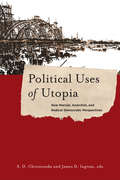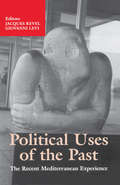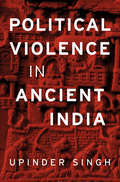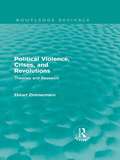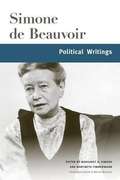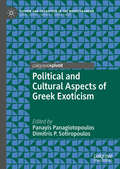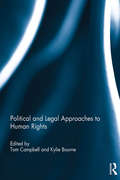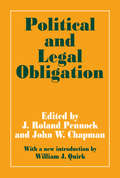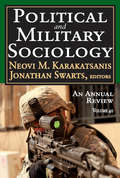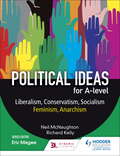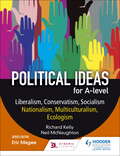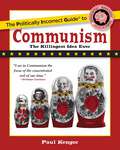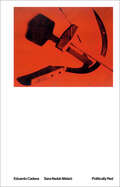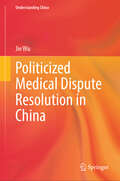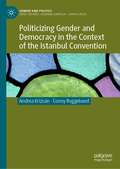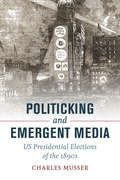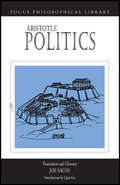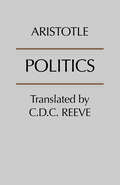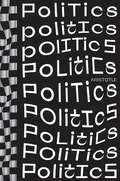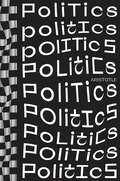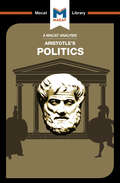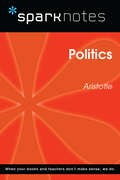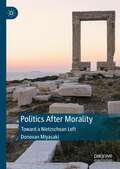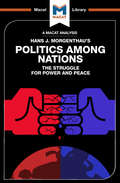- Table View
- List View
Political Uses of Utopia: New Marxist, Anarchist, and Radical Democratic Perspectives (New Directions in Critical Theory #26)
by James D. Ingram Edited by S. D. ChrostowskaUtopia has long been banished from political theory, framed as an impossible—and possibly dangerous—political ideal, a flawed social blueprint, or a thought experiment without any practical import. Even the "realistic utopias" of liberal theory strike many as wishful thinking. Can politics think utopia otherwise? Can utopian thinking contribute to the renewal of politics?In Political Uses of Utopia, an international cast of leading and emerging theorists agree that the uses of utopia for politics are multiple and nuanced and lie somewhere between—or, better yet, beyond—the mainstream caution against it and the conviction that another, better world ought to be possible. Representing a range of perspectives on the grand tradition of Western utopianism, which extends back half a millennium and perhaps as far as Plato, these essays are united in their interest in the relevance of utopianism to specific historical and contemporary political contexts. Featuring contributions from Miguel Abensour, Étienne Balibar, Raymond Geuss, and Jacques Rancière, among others, Political Uses of Utopia reopens the question of whether and how utopianism can inform political thinking and action today.
Political Uses of the Past: The Recent Mediterranean Experiences (A\special Issue Of Mediterranean Historical Review Ser.)
by Jacques Revel Giovanni LeviThis work addresses political and historiographical uses of history. A group of leading historians and thinkers discuss questions of collective identity and representation in relation to the fluctuating concept of "Past" and its changing relevance. Among the topics are Greek historiographical questions, Balkan history, the Armenian problem, and the Plaestine historical narrative.
Political Violence in Ancient India
by Upinder SinghGandhi and Nehru helped create a myth of nonviolence in ancient India that obscures a troubled, complex heritage: a long struggle to reconcile the ethics of nonviolence with the need to use violence to rule. Upinder Singh documents the tension between violence and nonviolence in ancient Indian political thought and practice, 600 BCE to 600 CE.
Political Violence, Crises and Revolutions: Theories and Research (Routledge Revivals)
by Ekkart ZimmermannFirst published in 1983, this extraordinary study provides a comprehensive systematic evaluation of cross-national theorizing and quantitative empirical evidence on four interrelated phenomena: Political violence Crises Military Coups D’ État Revolutions. Findings from social-psychological research on aggression are integrated in this outstanding study, as well as results reported in social-historical studies of revolution. The focus of the book is always on analytical perspectives and corresponding empirical evidence. The author continually highlights the sociostructural and political conditions of political violence, crises and revolutions. This exceptionally detailed and systematic inventory of theories and research on a classic triad of political science (political violence, crises and revolutions) also includes a remarkable bibliography encompassing over 3000 items.
Political Writings
by Simone De Beauvoir Sylvie Le Beauvoir Margaret A. Simons Marybeth TimmermannPolitical Writings offers an abundance of newly translated essays by Simone de Beauvoir that demonstrate a heretofore unknown side of her political philosophy. The volume traces nearly three decades of Beauvoir's leftist political engagement, from exposés of conditions in fascist Spain and Portugal in 1945 and hard-hitting attacks on right-wing French intellectuals in the 1950s, to the 1962 defense of an Algerian freedom fighter Djamila Boupacha and a 1975 article arguing for what is now called the "two-state solution" in Israel. In addition, this collection includes provocative essays in which Beauvoir analyzes American politics in ways of particular interest to scholars today.
Political and Cultural Aspects of Greek Exoticism (Reform and Transition in the Mediterranean)
by Panayis Panagiotopoulos Dimitris P. SotiropoulosThis book explores the new Greek exoticism by examining political and cultural mechanisms that contribute to Greece’s image and self-image construction. The contributions shed light on the subject from different perspectives, including political science, history of ideas, sociology, cultural studies, and art criticism. In the first part, the book provides a historical review with a focus on philhellenism, perceptions of antiquity and modernity, and the evolution of Greece as an idea. The second part looks at the current Greek crisis and analyses ideological, political and cultural aspects and stereotypes that contributed to the formation of contemporary Greek culture. The third and final part discusses notions such as aestheticism, idealism and pragmaticism, and deconstructs narrations of Greece through artistic media, such as films and exhibitions, which present a new oriental Utopia.
Political and Legal Approaches to Human Rights
by Tom Campbell Kylie BourneThis collection explores and illustrates issues arising from ‘political’ approaches to human rights in contrast to the more traditional ‘moral’ approaches. Moral approaches conceptualize and justify human rights in terms of priority rights which are both universal and moral. In contrast, political approaches focus on those human rights practices involved in the development and operation of human rights institutions, laws and political process, all in relative independence from their alleged moral foundations. The book contributes to the understanding and analysis of ‘political approaches’, including consideration of their diversity, and discussion of their strengths and weaknesses. The choice of contributors presents a balance between those theorists who favour some version of the political approach and those who are dubious about the perceived advantages. The chapters are grouped together in parts which constitute the distinctive issues addressed in the book. At a time when there is considerable uncertainty concerning their conceptual clarity, operation, feasibility, and their normative justifications, this volume will be of interest to those involved with the theory and practice of human rights, within law schools, and in politics and philosophy departments. It will also provide a useful resource for human rights practitioners and policy makers.
Political and Legal Obligation
by Pennock J. RolandAt a point in history marked by dramatic challenges to the existing political and social order, the question of legal and political obligation emerges as a focal point of international concern. Amid the clamor for radical change in the established order, theories of political obligation demand renewed examination. In this volume, eighteen leading specialists in the legal, philosophical, and political science aspects of the question offer their views on this timely topic. Part I examines the nature of moral, legal, and political obligation. The first essay presents a set of definitions that denies the very existence of obligation. While the second essay disagreeing particularly with respect to the relationship of political to moral tenets, and the third discussing the highly complex interplay between law and morality. The following essay approaches obligation as existing in the context of an established political and legal system and stresses the importance of evaluating the negative consequences of challenges to the law as well as those arising from the absence of challenges. The next paper maintains that political obligation is so complex that its very existence depends upon rational deliberation in particular contexts. The fifth, explores four significant theories but accepts only the one based on the broadest definition of obligation. While the final essay in this part considers political obligation a unique and generalized moral obligation. Part II takes up the conditions of obligation and of obedience. The first essay in this part discusses the conditions necessary to generate a "felt obligation." The second paper, concentrates on exposing key obstacles to empirical proof that behavior is or is not motivated by "felt obligation." While the third draws upon a large body of literature and court decisions dealing with compliance to the law. The forth essay is a case study of Rome probes the role of obligation during that city's seven cent
Political and Military Sociology: Volume 40: An Annual Review (Political And Military Sociology Ser.)
by Jonathan Swarts Neovi M. KarakatsanisSeveral contributions in this volume focus on the modern Middle East, with other articles examining justifications for war, the return of war veterans, white nationalists, and the activities of the Moral Majority.Maria Markantonatou addresses the blurring of distinctions between civilians and combatants. Udi Lebel investigates how the IDF is being changed by the increasing number of religious-Zionists recruited. Orlee Hauser argues that the experiences of women in the IDF vary depending on their positions and assignments. Bruce McDonald compares the performance of the Feder-Ram and augmented Solow models in accounting for economic growth in Iran. Neema Noori examines the interrelationship of war, the state, and mobilization in Iran. Molly Clever examines the justifications for war employed by both state and non-state actors. Christina Knopf uses relational dialectics to examine US veteran transitions. David Bugg and Dianne Dentice analyze attitudes and perceptions of white nationalists. Finally, Aaron Davis considers the rise of the Illinois state chapter of the Moral Majority in the 1980s.This volume in the Political and Military Sociology series also includes reviews of important new books in civil-military relations, political science, and military sociology.
Political ideas for A Level: Liberalism, Conservatism, Socialism, Feminism, Anarchism
by Richard Kelly Neil McNaughtonExam Board: AQA, Edexcel, OCR & WJECLevel: A-levelSubject: PoliticsFirst Teaching: September 2017First Exam: June 2018Build your students' knowledge of the ideas, tensions and key thinkers within the core ideologies of conservatism, liberalism and socialism, plus the additional ideologies of feminism and anarchism.Students will understand the core ideas and principles behind the political ideologies, and how they apply in practice to human nature, the state, society and the economy.- Comprehensive coverage of the ideologies of Liberalism, Conservatism, Socialism, Feminism and Anarchism- Definitions of key terms and concepts to help clarify knowledge and understanding of political language- Exam focus sections at the end of each chapter to test and develop understanding of key topics, offering practice for short and essay questions.
Political ideas for A Level: Liberalism, Conservatism, Socialism, Nationalism, Multiculturalism, Ecologism
by Richard Kelly Neil McNaughtonExam Board: AQA, Edexcel, OCR & WJECLevel: A-levelSubject: PoliticsFirst Teaching: September 2017First Exam: June 2018Build your students' knowledge of the ideas, tensions and key thinkers within the core ideologies of conservatism, liberalism and socialism, plus the additional ideologies of Nationalism, Multiculturalism and Ecologism.Students will understand the core ideas and principles behind the political ideologies, and how they apply in practice to human nature, the state, society and the economy.- Comprehensive coverage of the ideologies of Liberalism, Conservatism, Socialism, Nationalism, Multiculturalism and Ecologism- Definitions of key terms and concepts to help clarify knowledge and understanding of political language- Exam focus sections at the end of each chapter to test and develop understanding of key topics, offering practice for short and essay questions
Politically Incorrect Guide to Communism (The Politically Incorrect Guides)
by Paul KengorA brand-new installment of the beloved Politically Incorrect Guide series! The Politically Incorrect Guide to Communism is a fearless critique of freedom's greatest ideological adversary, past and present.
Politically Red
by Eduardo Cadava Sara Nadal-MelsioHow reading and writing are collective acts of political pedagogy, and why the struggle for change must begin at the level of the sentence.&“Reading is class struggle,&” writes Bertolt Brecht. Politically Red contextualizes contemporary demands for social and racial justice by exploring the shifting relations between politics and literacy. Through a series of creative readings of Karl Marx, Rosa Luxemburg, Walter Benjamin, W. E. B. Du Bois, Fredric Jameson, and others, it casts light on history as an accumulation of violence and, in doing so, suggests that it can become a crucial resource for confronting the present insurgence of inequality, racism, and fascism. Reading between the lines, as it were, and even behind them, Cadava and Nadal-Melsió engage in an inventive mode of activist writing to argue that reading and writing are never solitary tasks, but always collaborative and collective, and able to revitalize our shared political imagination. Drawing on what they call a &“red common-wealth&”—an archive of vast resources for doing political work and, in particular, anti-racist work—they demonstrate that sentences, as dynamic repositories of social relations, are historical and political events.
Politicized Medical Dispute Resolution in China (Understanding China)
by Jie WuThis book investigates the politicization process of social dispute resolution and its unintended consequences, under the context of over 70 percent of China’s public hospitals have experienced hospital violence, with patients acting violently toward medical workers to express anger, protect their rights, or monetary reasons. The examination of interactions between patients, hospitals, and government representatives in China is based on fieldwork conducted in a Chinese mega-city from 2015 to 2017, combining over 700 archival mediation cases, 156 hospital violence cases and their legal outcomes, and 72 in-depth interviews with patients, mediators, and healthcare professionals. It examines the rise of mediation and finds how the party-state utilizes the traditional mediation channel to address emerging social disputes, and the art of persuasion in mediation and finds how political stability and moral concerns influence and shaped their strategies and mediation outcomes. The first-hand data and valuable archival documents help depict citizens’ social dispute resolution process and reflect another facet of non-electoral political participation in China, also enriching the understanding of evolving government strategies in dispute resolution. This book is reader-friendly and could engage a wide and dynamic audience of researchers, healthcare professionals, and readers interested in medical sociology, regional study, or political participation in China.
Politicizing Gender and Democracy in the Context of the Istanbul Convention (Gender and Politics)
by Conny Roggeband Andrea KrizsánThis book examines opposition to the Council of Europe’s Istanbul Convention and its consequences for the politics of violence against women in four countries of Central and Eastern Europe. Krizsán and Roggeband discuss why and how successful anti-gender mobilizations managed to obstruct ratification of the Convention or push for withdrawal from it. They show how resistance to the Convention significantly redraws debates on violence against women and has consequences for policies, women’s rights advocacy, and gender-equal democracy.
Politicking and Emergent Media: US Presidential Elections of the 1890s
by Charles MusserPresidential campaigns of the twenty-first century were not the first to mobilize an array of new media forms in efforts to gain electoral victory. In Politicking and Emergent Media, distinguished historian Charles Musser looks at four US presidential campaigns during the long 1890s (1888-1900) as Republicans and Democrats deployed a variety of media forms to promote their candidates and platforms. New York--the crucial swing state as well as the home of Wall Street, Tammany Hall, and prominent media industries--became the site of intense struggle as candidates argued over trade issues, currency standards, and a new overseas empire. If the city's leading daily newspapers were mostly Democratic as the decade began, Republicans eagerly exploited alternative media opportunities. Using the stereopticon (a modernized magic lantern), they developed the first campaign documentaries. Soon they were exploiting motion pictures, the phonograph, and telephone in surprising and often successful ways. Brimming with rich historical details, Musser's remarkable tale reveals the political forces driving the emergence of modern media.
Politics
by Aristotle Joe Sachs Dr Lijun GuThe Focus Philosophical Library's edition of Aristotle's Politics is a lucid and useful translation for the student of undergraduate philosophy, as well as for the general reader interested in the major works of western civilization. This edition includes an introductory essay, notes, glossary, and index, intending to provide the reader with some sense of the terms and the concepts as they were understood by Aristotle's immediate audience.Focus Philosophical Library books are distinguished by their commitment to faithful, clear, and consistent presentations of texts and the rich world part and parcel of those texts.
Politics
by Aristotle C. D. ReeveNo other English-language translation comes close to the standard of accuracy and readability set here by Reeve. This volume provides the reader with more of the resources needed to understand Aristotle's argument than any other edition. An introductory essay by Reeve situates Politics in Aristotle's overall thought and offers an engaging critical introduction to its central argument. A detailed glossary, footnotes, bibliography, and indexes provide historical background, analytical assistance with particular passages, and a guide both to Aristotle's philosophy and to scholarship on it.
Politics
by AristotleA timeless study of politics and society by one of the all-time greatest thinkers.A student of Plato, Aristotle is considered a founding father of philosophy and ethics. This reflection on the role of government, and an individual's role within it, remains as prescient and relevant now as when it was written. One of the most influential books in history, Politics has influenced the greatest thinkers of the last 1,000 years and is a crucial book for those interested in evaluating the way our societies are structured.Part of a boldly designed series of classics, with wider margins for notes, this book is perfect for design-lovers and students alike. With bold, eye-catching graphic covers by Evi O Studio, this collection aims to introduce a selection of the most celebrated works of the last thousand years to a new audience. Featuring tales of adventure, fiction from the 19th and 20th centuries, feminist writings, and reflections on art, politics, philosophy and the origins of man, this is a small, wide-reaching and essential collection.'Man is naturally a political animal.'
Politics
by AristotleA timeless study of politics and society by one of the all-time greatest thinkers.A student of Plato, Aristotle is considered a founding father of philosophy and ethics. This reflection on the role of government, and an individual's role within it, remains as prescient and relevant now as when it was written. One of the most influential books in history, Politics has influenced the greatest thinkers of the last 1,000 years and is a crucial book for those interested in evaluating the way our societies are structured.Part of a boldly designed series of classics, with wider margins for notes, this book is perfect for design-lovers and students alike. With bold, eye-catching graphic covers by Evi O Studio, this collection aims to introduce a selection of the most celebrated works of the last thousand years to a new audience. Featuring tales of adventure, fiction from the 19th and 20th centuries, feminist writings, and reflections on art, politics, philosophy and the origins of man, this is a small, wide-reaching and essential collection.'Man is naturally a political animal.'
Politics
by AristotleA timeless study of politics and society by one of the all-time greatest thinkers.A student of Plato, Aristotle is considered a founding father of philosophy and ethics. This reflection on the role of government, and an individual's role within it, remains as prescient and relevant now as when it was written. One of the most influential books in history, Politics has influenced the greatest thinkers of the last 1,000 years and is a crucial book for those interested in evaluating the way our societies are structured.Part of a boldly designed series of classics, with wider margins for notes, this book is perfect for design-lovers and students alike. With bold, eye-catching graphic covers by Evi O Studio, this collection aims to introduce a selection of the most celebrated works of the last thousand years to a new audience. Featuring tales of adventure, fiction from the 19th and 20th centuries, feminist writings, and reflections on art, politics, philosophy and the origins of man, this is a small, wide-reaching and essential collection.'Man is naturally a political animal.'
Politics
by Riley Quinn Katherine BerrisfordAristotle remains one of the most celebrated thinkers of all time in large part thanks to his incisive critical thinking skills. In Politics, which can be considered one of the foundational books of the western political tradition, the focus is on problem-solving, and particularly on the generation and evaluation of alternative possibilities Aristotle’s aim, in Politics, is to determine how best to organize a society. He looks in turn at several different type of organization – kingship, oligarchy and the polity, or rule in the hands of many – and evaluates the arguments for each in turn. But he takes the exercise further than his predecessors had done. Having concluded that rule by the aristocracy would be preferable, since it would mean rule by citizens capable of taking decisions on behalf of the society as a whole, Aristotle subjects his solution to a further checking process, asking productive questions in order to make a sound decision between alternatives. Politics was ground-breaking in its approach. Unlike previous thinkers, Aristotle based all his ideas on a practical assessment of how they would play out in the real world. Ultimately, Aristotle argues, the problem of self-interest means that the adoption of a mixed constitution – one based on carefully considered laws which aims at a balance of power between the people and the elite – is most likely to bring eudaemonia (happiness). It’s a conclusion firmly based on careful evaluation (not least the process of judging the adequacy of arguments) and the product of outstanding problem-solving skills.
Politics (SparkNotes Philosophy Guide)
by SparkNotesPolitics (SparkNotes Philosophy Guide) Making the reading experience fun! SparkNotes Philosophy Guides are one-stop guides to the great works of philosophy–masterpieces that stand at the foundations of Western thought. Inside each Philosophy Guide you&’ll find insightful overviews of great philosophical works of the Western world.
Politics After Morality: Toward a Nietzschean Left
by Donovan MiyasakiThis book completes the project, begun in Nietzsche’s Immoralism: Politics as First Philosophy, of critically reconstructing a Nietzschean left politics. Nietzsche's incompatibilist ideal of amor fati requires reconceiving legitimacy as the breeding of a people whose material conditions enable it to affirm its social order. Justice is founded in a future, higher type’s right to exist against present individuals who internalize the contradictions of past societies. In opposition to Nietzsche’s self-undermining aristocratism, this right can only be realized through a universal promotion of the pluralistic unity of the manifold soul, secured by an equally manifold form of democracy. Against the covert aristocratism of liberal proceduralism, authentic democracy produces a true people grounded in shared, concrete happiness, requiring a comprehensive egalitarianism maintained by a permanent socialist state and achievable only through a populist, coalitional politics across identities that radically transforms the material conditions of our shared social life.
Politics Among Nations
by Ramon Pacheco PardoHans Morgenthau’s Politics Among Nations is a classic of political science, built on the firm foundation of Morgenthau’s watertight reasoning skills. The central aim of reasoning is to construct a logical and persuasive argument that carefully organizes and supports its conclusions – often around a central concept or scheme of argumentation. Morgenthau’s subject was international relations – the way in which the world’s nations interact, and come into conflict or peace – a topic which was of vital importance during the unstable wake of the Second World War. To the complex problem of understanding the ways in which the post-war nations were jostling for power, Morgenthau brought a comprehensive schema: the concept of “realism” – or, in other words, the idea that every nation will act so as to maximise its own interests. From this basis, Morgenthau builds a systematic argument for a pragmatic approach to international relations in which nations seeking consensus should aim for a balance of power, grounding relations between states in understandings of how the interests of individual nations can be maximized. Though seismic shifts in international politics after the Cold War undeniably altered the landscape of international relations, Morgenthau’s dispassionate reasoning about the nature of our world remains influential to this day.
